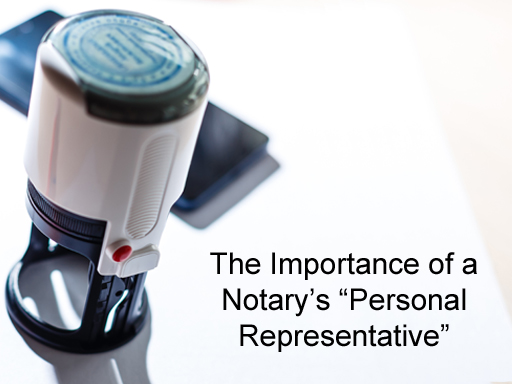Notary Public Underwriters Blog
The Importance of a Notary’s “Personal Representative”
- Details
- Published: October 6, 2021

Most practicing Notaries Public realize it’s mission-critical to ensure safe, secure storage of their official stamp or seal, recordbook (journal), and for electronic Notaries, the means of creating and affixing the Notary’s electronic signature.
But do enough Notaries arrange for the safety and security of these sensitive Notary tools if the Notary becomes incapacitated or dies? Tragedy can occur in an instant. Left unsecured, sensitive Notary tools can be used to impersonate the Notary in all sorts of fraud involving falsely “notarized” documents.
To protect the integrity of notarial acts in general, many states’ laws prescribe responsibilities regarding security and disposition of a Notary’s tools and records, and changes in a Notary’s active status. Here are the most common—but not all—such responsibilities.
To be performed by the Notary:
• maintaining sole custody and control of his or her/their official stamp or seal (embosser), journal records, and (if applicable) means of affixing their electronic signature or electronic seal; notifying the commissioning officer of a missing or stolen official stamp, seal or recordbook (journal); preventing use by anyone else of the Notary’s official stamp or seal; refusing to relinquish an official stamp, seal or records to an employer upon leaving that employer (unless the law provides any of a short list of exceptions); never sharing (if applicable) how to access the Notary’s electronic signature and/or electronic seal, electronic journal, or audio-visual recordings of remote online notarizations.
To be performed by the Notary or the Notary’s personal representative:
• destroying or disabling an official stamp or seal due to commission non-renewal, resignation, revocation, or loss of commission eligibility; storing or arranging for storage of notarial records including audio-visual recordings of remote online notarizations; reporting the storage location of notarial records to the Notary’s state commissioning officer; providing the commissioning officer access information for electronically stored notarial records; notifying the commissioning officer of the Notary’s incapacitation, death and/or inability to act as a Notary.
Clearly, a Notary’s “personal representative” is intended to step in when a Notary is incapable of performing certain essential duties that are mandated by law. But how many Notaries, right now, can say they have already designated a personal representative?
Persons with close ties to a Notary do voluntarily attempt to puzzle through issues such as reporting the death of a Notary to a commissioning officer, and determining what to do about the Notary’s official tools and records.
But when state law prescribes the duties of a personal representative, a Notary should designate a personal representative now, while they are capable of doing so, and inform that individual of all required actions to be taken if the Notary becomes incapacitated or dies. (Employers with multiple Notaries who notarize within their scope of employment should also familiarize themselves with the duties of a personal representative, and consider whether to establish any related internal procedures.)
Although not required, a sensible way for a Notary to memorialize their designation of a personal representative would be to spell out in writing the specific duties of a personal representative, and also note the individual’s name who agreed to act as personal representative. That written record should be securely stored with a Notary’s commission certificate and other commission-related documentation.
